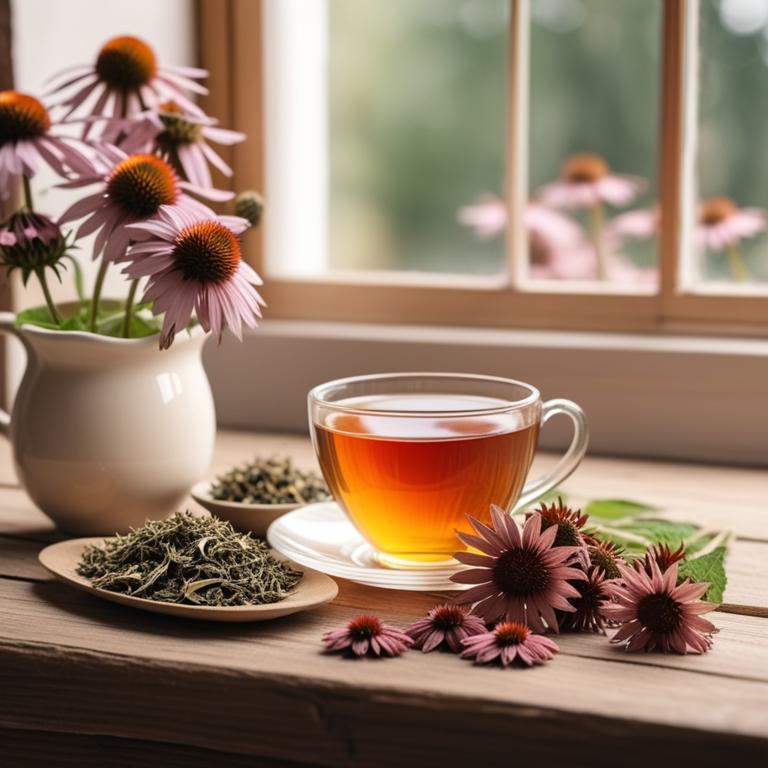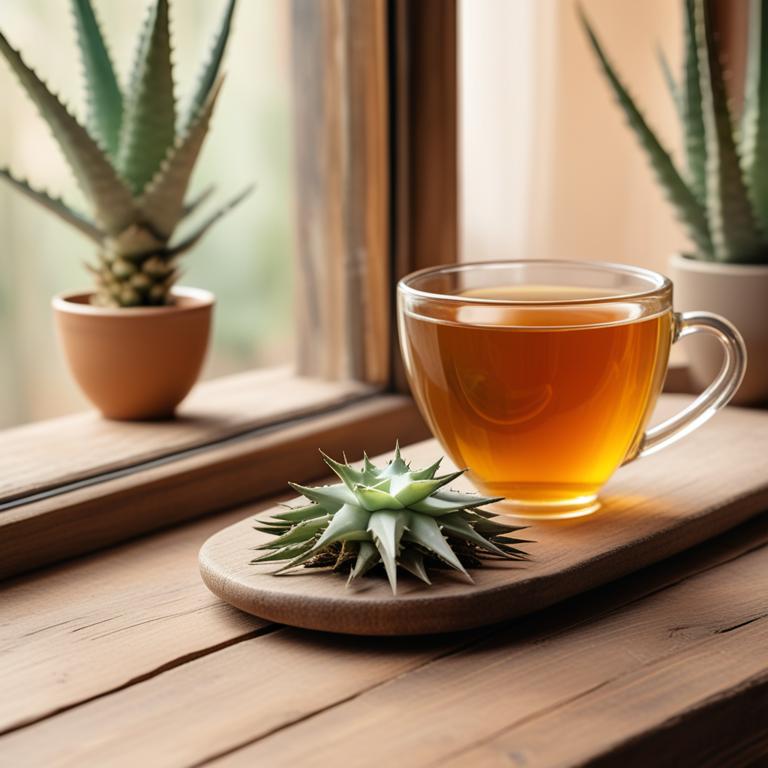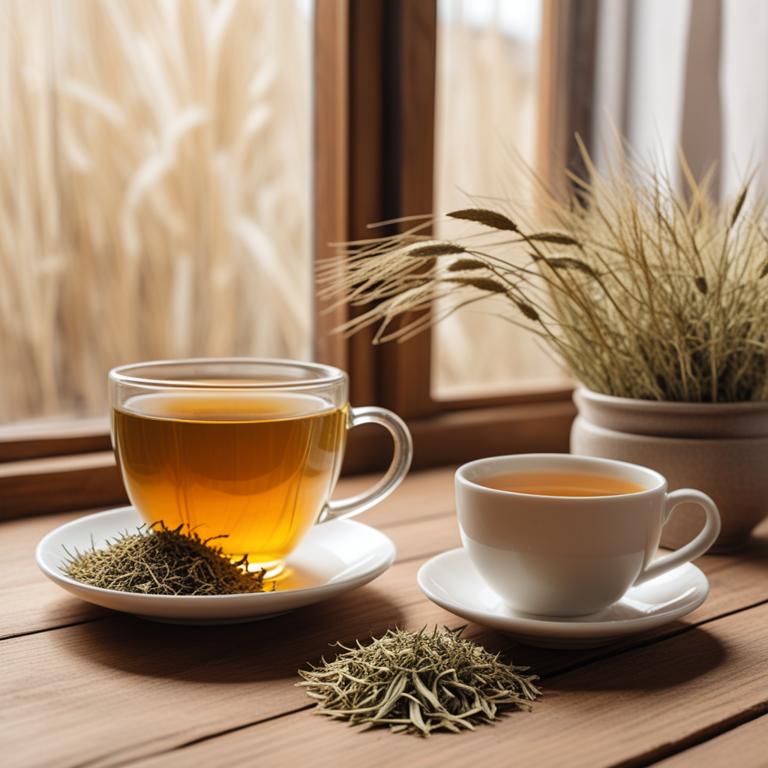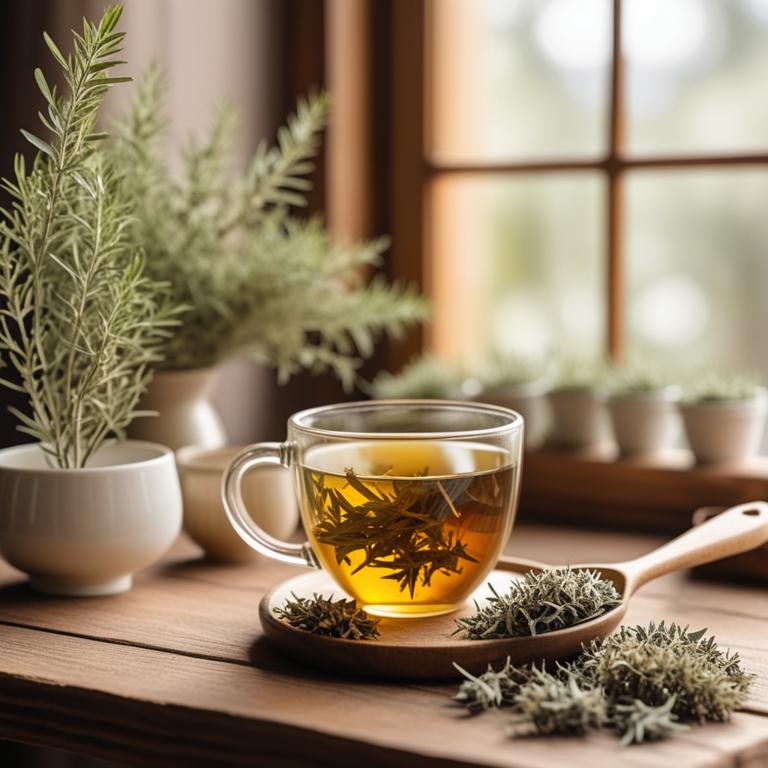11 Best Herbal Teas For Pimples

Herbal teas for Pimples are a natural remedy that involves brewing and consuming various plant-based teas to alleviate and cure acne and pimples.
These teas can treat this ailment by reducing inflammation, fighting bacterial infections, and regulating hormones, which contribute to the development of pimples.
Some examples of herbal teas that can help treat pimples include peppermint tea, which cools and soothes the skin, and chamomile tea, which reduces inflammation and promotes relaxation; other examples include green tea, rich in antioxidants that combat bacterial growth; licorice root tea, which regulates hormones and reduces inflammation; calendula tea, which has antibacterial properties that help combat acne-causing bacteria; and dandelion tea, which cleanses the body and promotes healthy skin.
By incorporating these herbal teas into one's daily routine, individuals can naturally and effectively treat pimples and achieve healthier, clearer skin.
Related Study
According to "RSC advances", teas for pimples may be beneficial due to their potential to contain phytochemicals such as terpenes, flavonoids, and phenolic compounds, which have been identified as antibacterial, anti-inflammatory, and antioxidant properties that can help combat acne-causing bacteria and reduce inflammation.
Below there's a list of the 11 best herbal teas for pimples.
Table of Contents
Also, you may be interested in...
Today Free Bonus!
The Ultimate Herb Drying Checklist
(For Long-Lasting Powerful Medicinal Effect)
How to easily dry herbs that don't mold and that keep their strong medicinal power for more than 1 year.
1. Calendula officinalis teas

Calendula officinalis teas are a popular herbal remedy used to treat pimples and acne due to their anti-inflammatory, antibacterial, and antiseptic properties.
This herbal preparation helps to reduce inflammation and prevent infection, promoting a clear and healthy complexion.
The bioactive constituents of Calendula officinalis teas, including flavonoids, carotenoids, and triterpenoids, work together to combat acne-causing bacteria and soothe irritated skin, making it an effective treatment for pimples.
By consuming Calendula officinalis teas, individuals can benefit from its ability to reduce the severity and frequency of pimples, promoting a smoother and more even skin tone.
Related Study
According to "Journal of ethnopharmacology", Calendula officinalis teas may be beneficial for pimples due to its ability to stimulate fibroblast proliferation and migration, potentially aiding in wound healing and skin regeneration.
Recipe:
- Gather 1 cup of dried Calendula officinalis flowers.
- Steep 2 tablespoons of flowers in 1 cup of boiling water for 5-7 minutes.
- Strain the mixture and discard the flowers.
- Add 1 tablespoon of honey to the tea for sweetness (optional).
- Let the tea cool down before applying it to the affected area using a cotton ball or swab.
Calendula officinalis teas can be beneficial in treating pimples, but possible side effects include skin irritation, allergic reactions, and increased sensitivity to sunlight, which may lead to further skin issues such as sunburns or rashes.
Precautions when using this herbal preparation include avoiding direct sun exposure for prolonged periods, applying a sunscreen with a high SPF, and monitoring skin reactions closely to adjust usage accordingly.
Calendula Officinalis Tea on Amazon
Organic Positively Botanicals Company, Calendula Herbal Tea Bags, 20 Count
Disclaimer: We earn a commission if you click this link and make a purchase at no additional cost to you.
2. Echinacea purpurea teas

Echinacea purpurea teas have been traditionally used to treat pimples and acne due to their anti-inflammatory and antimicrobial properties, which help to reduce redness and inflammation associated with this skin condition.
The bioactive constituents present in this herbal preparation, including alkylamides, caffeic acid, and flavonoids, work together to inhibit the growth of bacteria that cause acne, such as Propionibacterium acnes.
Echinacea purpurea teas also exhibit antioxidant activity, which helps to protect the skin from damage caused by free radicals and promote wound healing.
By incorporating Echinacea purpurea teas into your skincare routine, you may experience a reduction in the severity and frequency of pimples, as well as an improvement in overall skin health.
Recipe:
- Gather 2 tablespoons of dried Echinacea purpurea root and 1 tablespoon of dried flowers.
- Measure 1 cup of boiling water and pour it over the Echinacea mixture in a cup.
- Steep for 5-7 minutes, then strain the liquid through a fine-mesh sieve into another cup.
- Add 1 tablespoon of honey to the tea, if desired, and stir to combine.
- Drink the tea 2-3 times a day for pimples, but consult a doctor before using it as a treatment.
Echinacea purpurea teas can help alleviate pimple symptoms, but possible side effects may include allergic reactions, such as hives or itching, and interactions with other medications, particularly blood thinners.
Precautions should be taken when using Echinacea purpurea teas to treat pimples, such as starting with small doses and monitoring for adverse reactions, and being cautious when combining with other herbal or pharmaceutical remedies.
Echinacea Purpurea Tea on Amazon
BLUE TEA - Chamomile Tea - Butterfly Pea Flower -18 Count - Pyramid Tea Bag | DETOX TEA | Caffeine Free - Flower Based - Vegan - Non-Bitter - Natural Ingredients | Tin Packaging
Disclaimer: We earn a commission if you click this link and make a purchase at no additional cost to you.
3. Lavandula angustifolia teas

Lavandula angustifolia teas, also known as English lavender tea, have been used to treat pimples due to their anti-inflammatory and antibacterial properties.
The bioactive constituents of this herbal preparation, including linalool and linalyl acetate, help to reduce inflammation and combat bacterial infections that cause pimples.
By consuming Lavandula angustifolia teas, individuals can benefit from reduced redness, swelling, and the occurrence of pimples, as well as improved skin clarity and tone.
The calming and soothing effects of this herbal preparation also help to reduce stress, which is often a contributing factor to the development of pimples.
Recipe:
- Gather 1 cup of water and 1 tablespoon of dried Lavandula angustifolia flowers.
- Heat the water in a pot until it boils.
- Add the dried flowers to the boiling water and let it steep for 5-7 minutes.
- Strain the mixture into a cup and discard the flowers.
- Let the tea cool down, then apply it to the pimple using a cotton ball or swab.
Lavandula angustifolia teas can be used to treat pimples due to its antiseptic and anti-inflammatory properties, but possible side effects may include skin irritation, allergic reactions, and an increased risk of gastrointestinal upset.
To use Lavandula angustifolia teas safely, it is essential to start with small doses, monitor your skin reaction closely, and avoid consuming it if you have any pre-existing digestive issues or allergies to lavender.
Lavandula Angustifolia Tea on Amazon
Tiesta Tea - Lavender Chamomile Herbal Tea | Loose Leaf | Calming Blend with Chamomile and Lavender | Caffeine-Free Herbal | Great for Hot or Iced Brews | Resealable Bulk Pouch, 200 Cups | 8 Ounce
Disclaimer: We earn a commission if you click this link and make a purchase at no additional cost to you.
4. Aloe vera teas

Aloe vera teas have been used as a natural remedy to treat pimples due to their anti-inflammatory, antibacterial, and antiseptic properties, which help to reduce redness, swelling, and the risk of infection associated with acne.
The soothing and calming effects of aloe vera teas help to treat pimples by reducing inflammation and promoting the healing process, ultimately leading to faster recovery and reduced scarring.
The bioactive constituents, including aloin, aloe-emodin, and vitamins A, C, and E, present in aloe vera teas, contribute to their therapeutic effects by modulating the immune response, fighting off bacterial infections, and protecting the skin from oxidative damage.
The benefits of using aloe vera teas to treat pimples include reduced inflammation, improved skin texture, and a lower risk of scarring, making it a popular natural remedy for acne-prone skin.
Related Study
According to "Recent patents on anti-infective drug discovery", Aloe vera teas for pimples have clinical evidence regarding the effective management of acne.
Recipe:
- Gather 1 cup of fresh Aloe vera gel and 1 cup of boiling water.
- Strain the Aloe vera gel to remove any pulp or fibers.
- Combine the strained Aloe vera gel with boiling water in a pot.
- Let the mixture steep for 5-7 minutes, then strain it again.
- Drink the Aloe vera tea 2-3 times a week to help reduce pimples and inflammation.
Aloe vera teas can be used to treat pimples, but possible side effects may include skin irritation, allergic reactions, and stomach upset, especially when consumed in large quantities or for extended periods.
To minimize potential risks, it's recommended to start with small amounts, monitor your body's response, and avoid using it if you have sensitive skin or experience any adverse reactions.
5. Melissa officinalis teas

Melissa officinalis teas, also known as lemon balm tea, have been traditionally used to treat pimples due to their anti-inflammatory and antioxidant properties.
The herbal preparation helps to treat pimples by reducing redness and inflammation, preventing the formation of acne, and promoting wound healing.
The bioactive constituents of Melissa officinalis, including rosmarinic acid, beta-caryophyllene, and borneol, are responsible for its therapeutic effects, as they exhibit antimicrobial and anti-inflammatory activities that help to combat acne-causing bacteria and reduce inflammation.
The benefits of Melissa officinalis teas in treating pimples include reduced acne severity, improved skin texture, and a decreased risk of scarring, making it a potential natural remedy for acne-prone skin.
Recipe:
- Gather 1 cup of fresh Melissa officinalis leaves or 1 teaspoon of dried leaves.
- Pour 1 cup of boiling water over the leaves in a cup.
- Let the mixture steep for 5-7 minutes, then strain the leaves.
- Add 1 tablespoon of honey (optional) to the tea for taste.
- Drink 1 cup of the tea, 2-3 times a day, to help reduce pimple inflammation.
Melissa officinalis teas can be used to treat pimples due to its antimicrobial and anti-inflammatory properties, but it may cause side effects such as skin irritation, allergic reactions, and increased sensitivity to sunlight.
To minimize potential side effects, it is recommended to start with a small dose, avoid excessive consumption, and monitor the skin for any adverse reactions, and also to consume it in the evening or at night to minimize the risk of skin irritation and allergic reactions.
Melissa Officinalis Tea on Amazon
Maxx Herb Lemon Balm Extract - Max Strength Liquid Tincture Absorbs Better Than Capsules or Tea, for Nervous System Support, & Stress Management - Alcohol Free - 4 Oz Bottle (60 Servings)
Disclaimer: We earn a commission if you click this link and make a purchase at no additional cost to you.
6. Silybum marianum teas

Silybum marianum teas have been used traditionally to treat pimples due to their anti-inflammatory and antibacterial properties, which help to reduce redness and prevent the spread of infection.
The bioactive constituents of Silybum marianum, including silymarin and flavonoids, possess antioxidant and anti-inflammatory properties that aid in soothing the skin and reducing the severity of pimples.
The herbal preparation helps to treat pimples by reducing inflammation, preventing bacterial growth, and promoting skin health.
Regular consumption of Silybum marianum teas may help to reduce the occurrence and severity of pimples, promoting clear and healthy skin.
Recipe:
- Get Silybum marianum seeds or dried flowers. You can buy them online or at a local health store.
- Measure 1 cup of water and bring it to a boil.
- Add 2 tablespoons of Silybum marianum seeds or dried flowers to the boiling water.
- Reduce heat and let it simmer for 5-7 minutes. Strain the tea using a cheesecloth or a fine-mesh sieve.
- Drink 1 cup of the tea 2-3 times a day for 1-2 weeks to help reduce pimples.
Silybum marianum teas can be used to treat pimples, but it may cause side effects such as gastrointestinal issues, allergic reactions, and interactions with other medications due to its potential to stimulate the liver and increase bile production.
To use Silybum marianum teas safely, it's essential to start with a low dose, monitor your body's response, and avoid using it with other medications that can also stimulate the liver, as well as during pregnancy and breastfeeding.
Silybum Marianum Tea on Amazon
Celebration Herbals Organic Milk Thistle Seed Herbal Tea -- 24 Tea Bags, NET WT.60, 2.11 OZ
Disclaimer: We earn a commission if you click this link and make a purchase at no additional cost to you.
7. Aloe barbadensis teas

Aloe barbadensis teas have been traditionally used to treat pimples due to their anti-inflammatory, antibacterial, and antioxidant properties.
The anti-inflammatory properties of Aloe barbadensis teas help to reduce redness and swelling associated with pimples, while the antibacterial properties prevent the growth of bacteria that can cause infections and lead to acne.
The bioactive constituents of Aloe barbadensis teas, such as aloin, aloe-emodin, and aloin-A, have been found to exhibit antimicrobial and anti-inflammatory activities that contribute to their therapeutic effects.
Drinking Aloe barbadensis teas can help to treat pimples by promoting skin health, reducing inflammation, and preventing bacterial growth, making it a beneficial herbal preparation for acne treatment.
Related Study
According to "Life (Basel, Switzerland)", Aloe barbadensis teas for pimples have not been mentioned in the given study, but Aloe vera has been mentioned as a wound-healing botanical with considerable pharmacological properties, suggesting its potential benefits for skin issues like pimples, although more specific research is needed.
Recipe:
- Gather 1 cup of water and 2 tablespoons of Aloe barbadensis gel in a pot.
- Heat the water on low heat until it's warm, not boiling.
- Add 2 tablespoons of honey and 1 teaspoon of lemon juice to the warm water.
- Stir the mixture well and remove it from heat.
- Strain the mixture and let it cool down. Drink 1 cup of the tea 2-3 times a day for pimples.
Aloe barbadensis teas can be beneficial in treating pimples, but they may cause gastrointestinal side effects such as diarrhea, stomach cramps, and nausea in some individuals.
To use Aloe barbadensis teas safely, it's essential to start with a low dose and gradually increase it, and also to avoid using it for extended periods to prevent potential allergic reactions and interactions with other medications.
Aloe Barbadensis Tea on Amazon
The Republic of Tea Beautifying Botanicals® Clean Beauty Berry Aloe Herbal Tea Bags (36 count)
Disclaimer: We earn a commission if you click this link and make a purchase at no additional cost to you.
8. Zingiber officinale teas

Zingiber officinale teas, also known as ginger teas, have been traditionally used to treat pimples due to their anti-inflammatory and antibacterial properties.
These properties help to reduce redness and swelling, prevent infection, and promote healing of the affected skin.
The bioactive constituents of ginger tea, such as gingerols and shogaols, have been shown to exhibit anti-inflammatory and antimicrobial activities, which contribute to its effectiveness in treating pimples.
By using ginger tea, individuals can benefit from its ability to reduce the severity and duration of pimples, as well as promote overall skin health and well-being.
Recipe:
- Boil 1 cup of water in a pot.
- Add 1 tablespoon of grated fresh ginger root (Zingiber officinale) to the boiling water.
- Reduce heat to low and let it simmer for 5-7 minutes.
- Strain the tea into a cup using a fine-mesh sieve or cheesecloth.
- Drink the tea hot or let it cool down before consuming.
Zingiber officinale teas can be used to treat pimples, but using this herbal preparation may cause side effects such as stomach upset, nausea, and diarrhea due to its high ginger content, which can irritate the digestive system.
To minimize potential side effects, it is recommended to start with a low dose, drink plenty of water, and avoid consuming Zingiber officinale teas on an empty stomach to help reduce stomach irritation.
Zingiber Officinale Tea on Amazon
FGO Organic Ginger Tea, 100 Count, Eco-Conscious Tea Bags, Caffeine Free, Packaging May Vary (Pack of 1)
Disclaimer: We earn a commission if you click this link and make a purchase at no additional cost to you.
9. Cymbopogon citratus teas

Cymbopogon citratus teas, also known as lemon balm tea, have been used to treat pimples due to their anti-inflammatory, antiseptic, and antimicrobial properties.
This herbal preparation helps to treat pimples by reducing redness and inflammation, preventing bacterial growth, and promoting wound healing.
The bioactive constituents of Cymbopogon citratus teas, including limonene, geraniol, and linalool, possess antimicrobial properties that help to combat the bacteria causing pimples, while also reducing oxidative stress and inflammation.
The benefits of using Cymbopogon citratus teas to treat pimples include reducing the severity and duration of breakouts, preventing scarring, and promoting overall skin health.
Recipe:
- Gather 2 tablespoons of fresh Cymbopogon citratus leaves and 1 cup of boiling water.
- Add the leaves to the boiling water and let it steep for 5 minutes.
- Strain the tea into a cup and discard the leaves.
- Add 1 tablespoon of honey (optional) to the tea and mix well.
- Drink the tea 2-3 times a day to help reduce pimple inflammation and promote healing.
Cymbopogon citratus teas can be used to treat pimples, but possible side effects may include skin irritation, allergic reactions, and increased sensitivity to the sun.
Precautions should be taken to avoid consuming excessive amounts of Cymbopogon citratus teas, as it may interact with certain medications and cause stomach upset, diarrhea, or nausea.
Cymbopogon Citratus Tea on Amazon
J Mac Botanicals, Organic Lemongrass Tea Bags (100 Count), Lemon Grass Tea from Egypt, Manufactured in the USA
Disclaimer: We earn a commission if you click this link and make a purchase at no additional cost to you.
10. Glycyrrhiza glabra teas

Glycyrrhiza glabra teas, derived from the roots of the licorice plant, have been used for centuries to treat various skin issues, including pimples.
The anti-inflammatory and antiseptic properties of this herbal preparation help to reduce redness and prevent infection, thereby aiding in the treatment of pimples.
The bioactive constituents, such as glycyrrhizin and flavonoids, possess antioxidant and anti-inflammatory properties that help to soothe and calm the skin, thereby reducing the severity of pimples.
By using Glycyrrhiza glabra teas, individuals can benefit from its antibacterial properties, which help to eliminate the bacteria that cause pimples, promoting healthy and clear skin.
Recipe:
- Gather 1 teaspoon of dried Glycyrrhiza glabra root and 1 cup of boiling water.
- Steep the root in the boiling water for 5-7 minutes.
- Strain the liquid into a cup and discard the root.
- Add 1 tablespoon of honey to the liquid and mix well.
- Drink the tea 2-3 times a day to help reduce pimple inflammation.
Glycyrrhiza glabra teas can be used to treat pimples due to their anti-inflammatory and antibacterial properties, but possible side effects may include skin irritation, acne exacerbation, and increased sensitivity to the sun.
To minimize these risks, it is essential to start with small amounts and gradually increase the dosage, avoid combining with other skin products, and use sunscreen with at least SPF 30 when spending time outdoors.
Glycyrrhiza Glabra Tea on Amazon
Pukka Herbal Teas Licorice and Cinnamon - 20 Bags, 20 Count
Disclaimer: We earn a commission if you click this link and make a purchase at no additional cost to you.
11. Melaleuca alternifolia teas

Melaleuca alternifolia teas, also known as tea tree oil infusions, have been traditionally used to treat pimples due to their antimicrobial and anti-inflammatory properties.
The bioactive constituents of Melaleuca alternifolia teas, including terpinen-4-ol and cineole, help to combat the bacteria that cause pimples, reducing inflammation and preventing further breakouts.
As a result, Melaleuca alternifolia teas can help to clear up pimples, promote healthy skin, and prevent future blemishes.
The benefits of using Melaleuca alternifolia teas for pimple treatment include a reduction in acne severity, improved skin clarity, and a lower risk of scarring.
Related Study
According to the content, Melaleuca alternifolia teas for pimples have beneficial aspects, including antifungal, antiviral, antibacterial, and acaricidal activity against skin infections such as acne.
Recipe:
- Gather 1 tablespoon of dried Melaleuca alternifolia leaves and 1 cup of boiling water.
- Steep the leaves in the boiling water for 5-7 minutes.
- Strain the liquid using a fine-mesh sieve or cheesecloth into a cup.
- Add 1 tablespoon of honey (optional) to the tea and stir well.
- Let the tea cool down, then use it as a compress or apply it directly to the pimple using a cotton ball.
Melaleuca alternifolia teas can be beneficial in treating pimples, but it may cause side effects such as skin irritation, allergic reactions, and increased sensitivity to the sun due to the presence of compounds like limonene and caryophyllene.
Precautions to take when using Melaleuca alternifolia teas for pimple treatment include being cautious of interactions with other skincare products, avoiding excessive consumption, and keeping the tea away from children and pets.